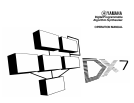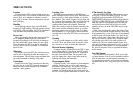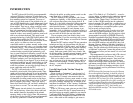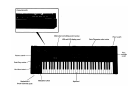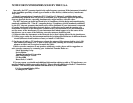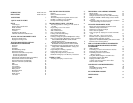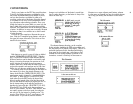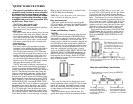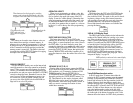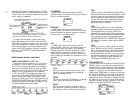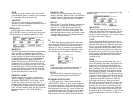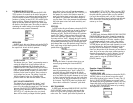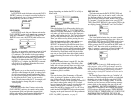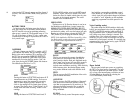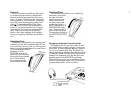PRECAUTIONS
Location
Avoid placing the DX7 in direct sunlight or close to a
source of heat. Also, avoid locations in which the instru-
ment is likely to be subjected to vibration, excessive
dust, cold, or moisture. Extreme temperatures can ruin
the LCD display
Handling
Avoid applying excessive force to the slide knobs,
dropping or rough handling. While the internal circuitry
is of reliable, solid state design, the DX7 is nonetheless a
fine instrument that should be treated with care.
Power Cord
Always grip the plug directly when removing it from
an AC receptacle. Removing the plug from the AC
receptacle by pulling the cord can result in damage to
the cord, and possibly a short circuit. It is also a good
idea to disconnect the DX7 from the AC receptacle if
you don't plan to use the instrument for an extended
period of time.
Relocation
If you plan to move the DX7 once it has been set up,
first be sure to disconnect all cables that connect it to
other equipment. This will help prevent accidental dam-
age to the instrument or shorting of the cables.
Connections
Carefully follow the "Setup" instructions in this man-
ual when you set up the DX7. Improper connection of
cables can lead to serious damage of the instrument,
amplifier, and/or speakers.
Cartridge Care
The RAM (user programmable) and ROM (factory
preset) cartridges have no moving parts, other than their
memory protect or bank selector switches, nor do they
have batteries. They should, however, be kept clean and
dry to protect their connectors. They should also be kept
away from strong electrostatic fields, as produced by
sparking electric motors and solenoids, fluorescent
lights, and so forth; as with all electronic memories, the
data (voices) could be accidentally altered. As a further
precaution against voice loss in the event of a synthe-
sizer malfunction, it is a good idea to remove the RAM
cartridge from its slot in the DX7 before you turn power
on or
off.
Cleaning
Use only a mild detergent on a cloth, and dry with a
soft cloth. Never use solvents (such as benzine or thin-
ner) since they can melt or discolor the instrument.
Electrical Storms (Lightning)
Computer circuitry including that in the DX7, is sensi-
tive to voltage spikes. For this reason, the DX7 should
be turned off and unplugged from the AC receptacle in
the event of an electrical storm. This precaution will
avoid the chance that a high voltage spike caused by
lightning will damage the instrument.
Electromagnetic Fields
Computer circuitry is also sensitive to electromagnetic
radiation. Television sets, as well as radio receivers,
transmitters and transceivers, and wireless microphone
or intercom systems are all potential sources of such
radiation, and should be kept at least several feet from
the DX7 to avoid possible interference or random "errors."
If The Sound is Too Quiet
Check the FOOT CONTROL. There are two foot con-
troller jacks, VOLUME and MODULATION. Two addi-
tional jacks are for foot switches, SUSTAIN and
PORTAMENTO. If the foot controller is plugged into the
SUSTAIN or PORTAMENTO jack, it will not work. Also,
when the controller is plugged into the VOLUME jack
and is tilted forward, there will be little or no sound
regardless of how you set the VOLUME control on the
front panel.
Some voices are inherently quieter than others. Often
this is due to the amount of touch sensitivity which may
be programmed into a voice. If the voice is programmed
so that the note will become louder if you press the key
harder, or if you press it faster, then a less vigorous play-
ing style will result in a quieter note. Played the same
way another voice which is less touch sensitive will
sound louder. The voice which is initially louder, how-
ever, may not become much louder (if at all) as you play
the notes harder. These qualities are user-programma-
ble, even for the preset voices, as explained elsewhere
in this manual.
Save This Manual
The information in this manual is likely to be useful
for future reference. Even if you feel reasonably familiar
with the instrument, save this manual; reviewing it a
few months from now, after you have had considerable
experience with the DX7, may prove to be very informa-
tive.




